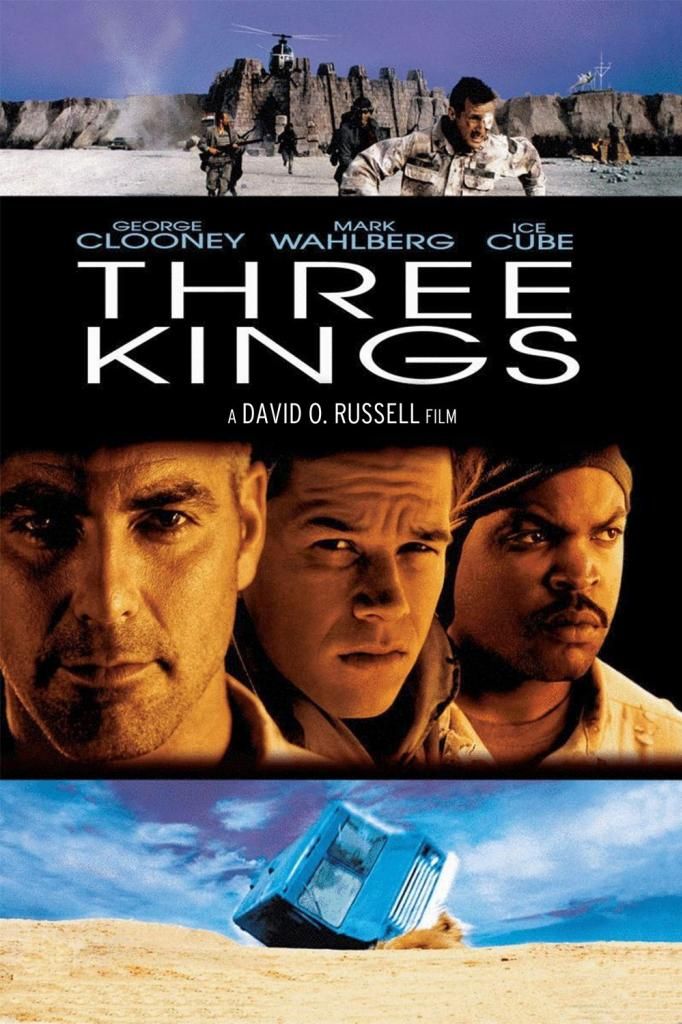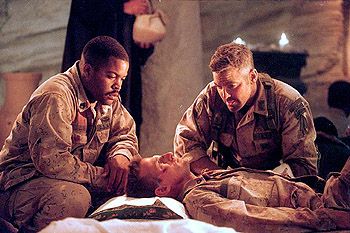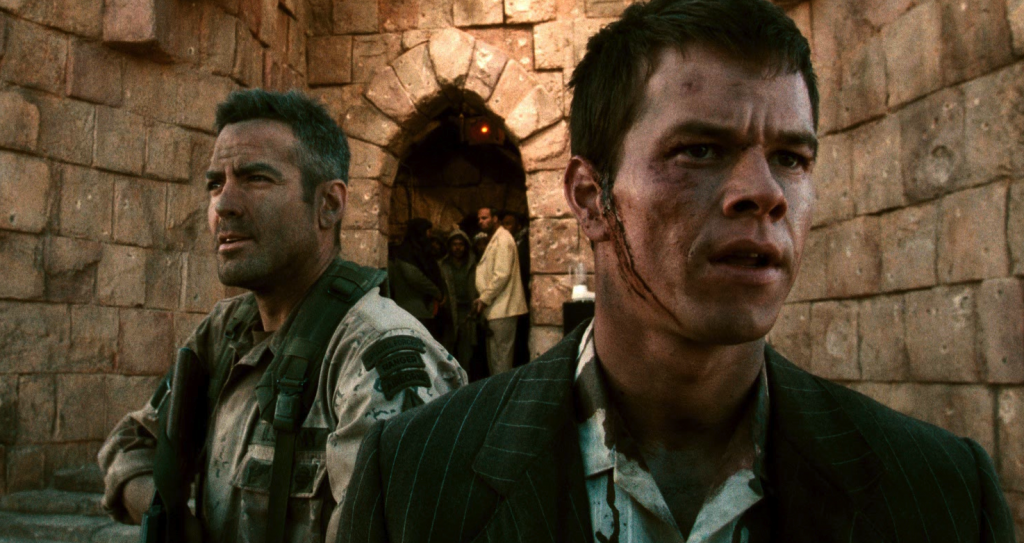Three
Kings
1999
Director: David O. Russell
Starring: George Clooney, Mark
Wahlberg, Ice Cube, Spike Jonze
I
have never been to war. Shocking, I
know. Sometimes when I watch a war film,
especially one made in the last thirty to forty years, I wonder if it’s
realistic. Obviously, I have no way of
knowing. Parts of Three Kings really felt
realistic to me; I, as a total and complete outsider, watched it and couldn’t
help but wonder if that was what parts of Gulf War I were really like. But then, of course, I remember that I have
no frame of reference, so I’m basically talking out of my ass.
It’s
the end of Gulf War I, 1991. Saddam
Hussein has signed a treaty ending the war and starting a cease fire. Soldier Troy Barlow (Wahlberg) finds a
surrendering Iraqi who has a map hidden up his butt. Taking it to his friend Conrad (Jonze) and
superior Elgin (do I just say Cube here?), they are joined by Special Forces
soldier Archie Gates (Clooney) as they pursue what they believe to be stolen
Kuwaiti treasure. What was originally
meant to be a half-day excursion to find some gold turns into something more
when the foursome becomes more deeply embroiled in the ongoing conflict between
Saddam’s Republican Army and the rebel uprisings.
Three
Kings came
out in an interesting time in America’s relationship with Iraq – more than half
a dozen years since the end of Gulf War I, but only a few years away from Gulf
War II. Given that this is still a
conflict that upsets the American political landscape to this day, this was
possibly one of the only windows in which such a film could have been
released. The public would have been
willing to listen to a story that has many sympathetic Iraqi characters in
1999; I doubt, even today, that most of the American public would be incapable
of “sitting through” such a tale. To me,
that’s Three Kings greatest success.
The politics of America in the Middle East has become incredibly
complicated, and there is a great deal of negative feelings that still
exist. To watch a film that shows
empathy from American soldiers towards Iraqi people is heartening (even if, to
my cynical self, it does seem a bit fairy tale). To take characters that start as naïve,
superficial, and greedy, and give them a compassionate heart against a
politically charged background is a very fulfilling emotional journey to undergo.
Having
said that, however, I don’t think Three Kings is entirely successful
as a film. It feels chaotic. Now, before you go yelling at me that ‘but
it’s war and war is chaotic!’ let me explain what I mean. Yes, the battle sequences feel chaotic, but
rightly so. That is a chaos that works,
mostly achieved through gritty handheld camera work and smart editing. But Three Kings has a problem with split
focus that keeps all its myriad components from gelling as well as they
should. The opening half hour is played
for fairly broad, black comedy, painted so right from the get-go with
Wahlberg’s question of “So are we shooting or what?” when encountering a
surrendering soldier who may or may not be hostile. This humor continues to pop up throughout the
film, usually when least expected. It’s
funny, but when you contrast it with a scene where truly horrible things are
happening and the film is trying to underline a serious moral message, the
comedy feels out of place. If anything,
the constant humor took away the gravitas that the ending so desperately
aspired to. I couldn’t buy into the
emotional heft as much as I wanted to because the movie had been too zany prior
to that point. More than that, the film
takes its damn time establishing said emotional heft. We don’t really start to understand the
everyday implications the Gulf War has had on Iraqi citizens until about
halfway through the film, and that leaves our main characters only the last
third to quarter of the film to process the information and perform a moral
180; not much time at all.
Additionally,
Three
Kings was a bit of a tease.
There were threads and stories that I found compelling that were not
developed as much as I would have preferred.
Of course, that’s most likely a matter of personal taste, but of all the
events in Three Kings, I was most interested in the sequence where
Wahlberg’s character, taken hostage by members of the Republican Army, is
interrogated and tortured. Slowly, he
begins to realize just what price the war has had on Iraqi citizens as his
torturer tells him how his young wife and child were killed in a bombing. I found the connection between Wahlberg’s
Troy Barlow and his Iraqi counterpart fascinating. It was one of the strongest psychological
angles of the film, pitting enemies against one another only to have them find
common ground. But then, as soon as
Barlow had started to realize this, as soon as I felt we were getting to some
really meaty, interesting issues, it was over.
Wait, what happened there? Perhaps
it’s simply an issue I have with most dramedies in general. By dividing overall focus, I end up feeling
satisfied with neither the drama nor the comedy. There are certainly a few exceptions to this
rule, but not many.
The
acting performances are all good. George
Clooney was still shooting ER when Three
Kings was made, and apparently split his work week between the two
projects: four days on the film, three days on the television show. Clooney is an actor I was incredibly
skeptical of when he started off as Dr. Doug Ross on ER, mostly because of all the ridiculous hype he got because he’s
“dreamy.” Three Kings was a
transition project for him, his attempt to prove that he could hack it in films
just as well as TV. He’s largely
successful as a leading man in Three Kings, and his Archie Gates
here as many shades of Danny Ocean from Ocean’s Eleven (heck, they’re both
heist movies), which was only two years after this film. I like George Clooney a great deal now
because I respect him; I think he chooses smart projects that fit his acting talent
very well. I do not think he’s the most
talented actor who’s ever lived, and I maintain that in most of his roles, he’s
essentially playing slightly different versions of the same role, but the thing
is, he does it well. He’s very much the
new Cary Grant, another actor who I believe simply played variations on the
same character, but was very smart in that he played that character very
well. (Plus they share the suave thing
in spades.) Anyway, in Three
Kings, we have one of the first examples that Clooney is capable of
carrying a film as the leading man. Wahlberg
and Cube (it amuses me to call him simply “Cube”) shed their singer backgrounds
in a big way by proving themselves capable of playing soldiers who have to make
a real emotional journey. Spike Jonze,
however, is possibly most impressive as Conrad, a noob and a dim-wit who
idolizes Barlow. In his first acting
role in film, Jonze impresses, flat-out.
If anything, I wish his character was given a bit more scope in the
second half.
There
was a preface to the film on the DVD I watched – which, I must add, looked like
a very old DVD, printed at the very beginning of DVD technology. It explained that the director used alternate
editing techniques and amped up color palettes in order to heighten the
emotional experience of the film. It
honestly made me snort with laughter.
Has film technique altered so much in the last fifteen years ago that,
back in 1999, the director had to actually explain to his audience that the
bleach-drenched colors or slow-motion sequences or handheld camerawork or
cutting to fantasy or flashback sequences was done on purpose and for cinematic
effect? Three Kings still feels
fresh today thanks to these effects; if anything, Russell was ahead of the
curve (apparently). If anything, such a
message feels like a modern day version of audiences becoming frightened when
Justus D. Barnes fires his gun straight to camera in The Great Train Robbery
in 1903 while the theater owner shouts at them that it’s not real.
I
will also one more little tidbit about watching Three Kings. I mention above that I had an old DVD (from
Netflix). The DVD was incapable of
playing about 8 minutes of the film approximately half an hour in, in the scene
where our four soldiers discover the bunker down the well. I had to skip most of that scene, picking up
when they were leaving that village. I
had little choice, as the DVD was completely freezing up, but I know I missed
some important stuff there. So, take
what I say with the proverbial grain of salt.
And I will report the problem to Netflix.
Arbitrary
Rating: 7/10. Three Kings is a good
film, but it is not great.



I stand by my original assessment of this film--it's a good one, but not a great one, and I have no clue as to how it wound up on The List.
ReplyDeleteHas it officially been removed from The List, or is it still in there? I forget.
DeleteDoes it deserve to be on The List? I don't know. Do I understand why it was placed there initially? Yes I do.
This film was much praised when it came out and I saw it when it came to video/DVD. While I thought it was a decent film I didn't get why critics thought it was so special. I agree with Steve in that I don't see why it's on the list, other than critics loved it and critics compiled the list.
ReplyDeleteAnd in answer to your question, Three Kings is still in the book. It has never been removed, even though such entries as Amelie, Boogie Nights, O Brother Where Art Thou, Y Tu Mama Tambien, Monsoon Wedding, The Pianist, Adaptation, Chicago, Hero, The Barbarian Invasions, Million Dollar Baby, A Very Long Engagement, Children of Men, Volver, and The Wrestler have all been removed.
I really question why it's still in the book. I definitely understand why such a film from 1999 would make it into the annals of The Book in 2002, or even through 2004/2005, but now? Especially, as you say, when all of those other films have been cut. That I don't understand.
Deletecurry 6
ReplyDeletelongchamp handbags
nike max
supreme hoodie
coach outlet
balenciaga trainers
off white
air max 2018
converse outlet
timberland boots
visit the site Get More Info visit the site i was reading this find out here now click for info
ReplyDelete